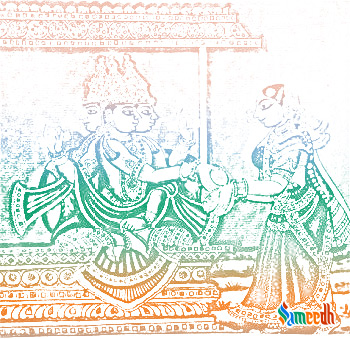Who is the mother of all creation? Let us try and understand the meaning, significance of Aditi and the eternal cyclic re-birth of the same divine essence.
Image Source: Saraswati Mahal Library Collection, Tanjore
Aditi, (boundless or limitless or innocence) is an important goddess right from the Vedic phase in Hinduism. She is the personification of the infinite cosmos and mother of a group of celestial deities called the Adityas. She is considered the goddess of motherhood, unconsciousness, the past, the future and fertility. She is the celestial mother of numerous beings, the synthesis of all things, she is associated with akasha and with speech. She may be seen as a feminised form of Brahma and associated with the mulaprakriti in the Vedanta. She supports the sky, sustains all existence, and nourishes the earth. It is in the latter sense that she is often represented as a cow. She is mentioned more than 250 times in the Rigveda, the verses replete with her praise.
The first mention of Aditi is found in Rigveda, which is dated by mainstream consensus to have been composed between 1800 and 1200 BC. She is portrayed as the mother of the Adityas, a group of societal Rigvedic deities. Her sons, the Adityas, are of uncertain number and identity. Varuna is their chief, and they are called like him ‘upholders of divine order (rta).’ One hymn names them as Varuna, Mitra, Aryaman, Daksha, Bhaga, and Amsha. Sometimes Daksha is excluded and Indra, Savitar, and Dhatri are added. In later periods their number is increased to 12, and they are linked to the 12 solar months of the year. As the mother of the societal deities, she represented the compliance to social behaviour. Her motherhood was also an important attribute, and later was expanded so that she became the mother of all deities.
Aditi is the eldest daughter of Daksha and Panchajani. The Puranas, such as the Shiva Purana and the Bhagavata Purana, suggest that Daksha married off Aditi and 16 others to Kashyapa rishi. Aditi had 33 sons with sage Kashyapa, of which twelve are called Âdityas including Surya, eleven are called Rudras and eight are called Vasus. Aditi is said to be the mother of the great god Indra, the mother of kings (Mandala 2.27) and the mother of gods (Mandala 1.113.19). As per the Vedas, Aditi is Devamata, as from her and her cosmic matrix all the heavenly bodies were born. She is also the mother of the Vamana, avatar of Vishnu. Accordingly, the Vamana avatar, as the son of Aditi was born in the month of Shravana under the nakshatra Shravana.
In the Rigveda, Aditi is one of the most important figures of all. Aditi is often asked to guard the one who petitions her (Mandala 1.106.7; Mandala 8.18.6) or to provide him or her with wealth, safety, and abundance (Mandala 10.100; 1.94.15). The verse ‘Daksha sprang from Aditi and Aditi from Daksha’ is seen as a reference to ‘the eternal cyclic re-birth of the same divine Essence’ and divine wisdom.
As Aditi, she is an unbound, free soul she is often called to free the petitioner from different hindrances, especially sin and sickness (Mandala 2.27.14). In one hymn, she is asked to free a petitioner who has been tied up like a thief (Mandala 8.67.14). She is called the supporter of creatures (Mandala 1.136). Aditi was attributed the status of first deity by the Vedic culture, although she is not the only one attributed this status in the Vedas. She is addressed in the Rigveda as ‘mighty’ and revered as the eternal mother of all creation.
Like many other Hindu gods and goddesses, Aditi too has a vahana, a Garuda. The Garuda reflects Aditi’s nature of cyclical rebirth and infinite creation. Her weapons include the famous Trishula and a sword.
